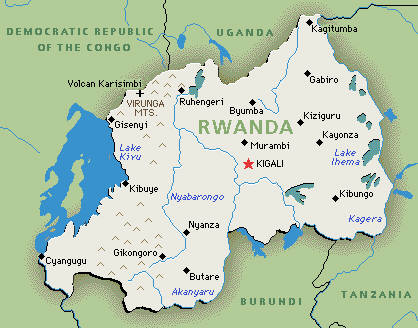Phones Powerful Human Rights Tools Only When Companies Don’t Side with Repression
On August 9, 2011, Katrin Verclas posted a piece at MobileActive.org demonstrating the obverse of power of cell phones as a tool for citizen journalism and human rights activism. As much as we laud the power of mobile technology for helping to call immediate attention to human rights situations around the world, it is sobering to remember that the companies that make it possible for people to communicate and share information via cell phones can be the single largest obstacle to using our phones as powerful tools of protest and awareness-building. As Ms Verclas reports, mobile phone companies side more often than we would like with the repressive regimes that people–their customers–seek to resist:
Vodafone’s recent decision to shut down its communications network in Egypt and the delivery of pro-government propaganda via text message over its network made the news but that was just the tip of the iceberg. The examples abound: Uganda operators monitored and blocked certain SMS keywords in the advent of the recent election there, pro-Zanu propaganda is widely delivered over Zimbabwean operator networks, Russian mobile operators agreed to ‘police’ the Internet and their networks at the behest of the Russian government, and Belarussian telcos routinely supply information to the security police, including location information of known political activists.
This close collaboration of many operators with repressive states has been going on for some time but there is now a new activist movement forming, holding telcos accountable and to a higher standard. Led by activist shareholders and advocacy organizations like Access, activists point out that the negative publicity of this corporate behavior carries financial implications that pose a risk to telco investors.
Ms. Verclas goes on to illustrate how activist groups such as Access Now seek pressure telecommunications companies to stop siding with repressive regimes, namely, by pressuring them through bringing liability suits for injuries incurred and lives lost in areas of repressive conflict that could have been prevented if victims had had cell phone service. The goal of Access Now is to pressure telecom groups to live up to five principles, which are as follows:
- Providers should retain complete control over their network at all times and ensure
that users always have access to it. - Providers have a duty to protect their users.
- Providers should uphold principles of non-discrimination and should abstain from filtering their networks, except for the purposes of network security and management.
- Providers should uphold principles of transparency, accountability, appealability, and due process in all of their actions and transactions.
- Providers should commit to using spectrum allocation in a judicious and equitable manner.
Activists are using lawsuits as a means of putting moral and financial pressure on telecommunications companies to avoid implicitly siding with repression, which is what they in effect do when they think of their bottom lines before the lives of the individuals who use their service.
Documenting Documentation Practices in Rwanda: Your Assistance Please!

Image courtesy of: http://wwp.greenwichmeantime.com/images/time/africa/rwanda.jpg
Next Friday, May 21, 2010 I will be heading to Kigali, Rwanda, where I will engage in two weeks of field work investigating how human rights groups there document their work. Like my trip to Mexico in February, this trip is part of CRL’s larger “Human Rights Electronic Evidence Study.” The general purpose of this study is to gain a better understanding of “life on the ground” for a variety of human rights organizations and how that affects their documentation practices. An ultimate goal in this work is to provide profiles of strategies that help organizations meet their immediate goals, as well as to think about how the variety of documentation that gets collected can serve long term work in scholarship, legal proceedings, and policy-making at local, national, and international levels. Hopefully, this work will engender and support dialogue between human rights organizations on the one hand, and larger institutions such as libraries and intergovernmental organizations on the other so that creative strategies can be developed for catloguing and preserving these valuable materials.
A call for input/advice/help
As with my first trip to Mexico, my task in Rwanda will be to actually see documentation practices in action and better understand why and how a variety of human rights groups collect and save (or not) the materials they need for their work. Unlike my Mexico trip, however, I have no clear idea of which groups I will actually get to visit, with one exception–I am traveling with colleagues from The University of Texas Libraries who work closely with the Kigali Genocide Memorial Center on a ground-breaking collaboration focused on digitizing and archiving the center’s physical collections of genocide materials. See the post on UT Human Rights Archiving and Glifos for a brief overview of the work they have been doing there. I will spend part of my time in Kigali helping my UT colleagues as I can with their work and learning as much as possible bout the center’s collections and preservation efforts. I look forward to reporting on what I learn when I return.
However, beyond this one “sure-thing” site, I have nothing else fixed at this point. Rwanda is apparently a seat-of-your-pants kind of place-at least according to the few people I’ve been able to talk to so far, and this is just the first of many cultural differences that impact how we understand documentation practices around the world. So, in fine anthropological fashion, I will arrive and start knocking on doors. Thus, readers, if you know of groups or individuals that I should approach, please let me know! Below is a preliminary list of groups I hope to visit, but I would love to have more leads to follow up on once I get there. Please post any suggestions using the comments feature of the blog–they might be useful to others as well.
- International Criminal Tribunal for Rwanda (ICTR) documentation centre at the Gasabo Judicial Palace, the seat for the Gasabo Tribunal of Higher Instance.
- Offices for the UN Development Program in Kigali
- Ligue des droits de la personne dans la région des Grands Lacs (LDGL)–Human Rights League of the Great Lakes. This will be tricky for me, as I don’t speak French, but I will engage an interpreter once I am in Kigali.
- Voices of Rwanda
Seeing the ICTR collection is a high priority for me because of the international profile of this work–the tribunal serves as a model for future reconciliation and justice efforts, so understanding the disposition of their collections could provide ideas to smaller organizations with useful documentation that they might want to send up to the international courts. I also plan to visit the Kigali Peace Corps offices to see if they know of anyone I should contact.
This will be a grand adventure! I thank all of you in advance for any and all suggestions. The more potential resources I have, the better the field data I can collect, and the more I will be able to share with you.
Thank you in advance for your help,
Sarah
Does Innovation Stifle Technology?
With the imminent release of Apple’s new iPad (hitting stores April 3, 2010), the innovative gizmo has generated quite a bit of excitement and talk–and even a bit of trepidation. Though Apple heralds the iPad’s innovative design as revolutionizing the way users consume information, some fear that it will actually stifle new technologies (see “Apple iPad Will ‘Stifle New Technologies” by Jonathan Harwood at The First Post). Among those expressing concern is Internet Archive’s director, Brewster Kahle, who states in the article just cited that “[Apple] really control[s] the horizontal and the vertical by going with the iPhone platform [for the iPad]… I think it’s discouraging. The future is controlled, and it’s controlled by Apple.” The concern here is largely targeted at the fact that the iPad will only allow proprietary applications to run on the machine, forcing customers to purchase all of their on-line media from Apple. These media include newspapers with proprietary relationships with Apple for display on the iPad, e-books, music, and over 150, 000 iPad-specific applications (see the Official iPad Store for full product details).
Further evidence for trepidation about the iPad’s impact on technology can be found at the Refreshing Blog: Thoughts Related to Apple’s IPOD and IPHONE, where a February post with the title “Who Doesn’t Love the iPad?” states:
Why on earth are people signing a petition against the iPad? Around 5000 people gave a digital signature to a petition against the iPad, which is petitioning the CEO of Apple to remove digital rights from the contents of the device. What this basically means is that the digital rights allow Apple to block competing products, disable certain features, delete books, delete news, and other functions without permission from the user. This is something that up to 5000 people disagree with, and they made their statement online.
Apparently, there is considerable concern about how iPad’s business model could limit consumer choice, as well as technological innovation.
But is such concern really warranted? The answer is probably not–the beauty of the technology market is that competition spurs innovation at a dizzying rate. Even now, Asus (another technology company that designs media readers), is creating two tablets designed to compete directly with the iPad. These tablets will also present news, blogs, books, music, and internet access, but they draw from competing platforms for their operating systems. One will use either Google Chrome or Android, while the other will use Microsoft Windows (see techtree.com for an overview of the Asus tablets). In both cases, book sellers, newspapers, and other media purveyors will adapt to the demands of users of competing gizmos by producing and selling media in a variety of formats. If this is the case, then we have to see iPad as one product within a range of products that will appeal to large numbers of consumers for a variety of reasons. This competition between technologies and platforms should spur technology rather than stifle it.
Of course, the subsequent expansion in documentation types will prove to be a challenge for those seeking to preserve electronic documentation–but that has always been the case in digital preservation.
Human Rights Day 2009: Non-Discrimination

2000 Census Map of Chicago illustrating racial concentrations. Image courtesy of http://trueslant.com/megancottrell/
Today, December 10, 2009, is designated by the UN as Human Rights Day and this year’s focus is on discrimination. As stated on the UN’s home page for Human Rights Day 2009:
The realisation of all human rights – social, economic and cultural as well as civil and political rights – is hampered by discrimination. All too often, when faced with prejudice and discrimination, political leaders, governments and ordinary citizens are silent or complacent.
This theme brings home the fact that human rights violations aren’t limited to places beyond the United States, where people suffer under authoritarian dictators, are conscripted to fight in wars that have nothing to do with them, or forced to work in inhumane conditions. Discrimination is alive and well in the United States and prevents our own citizens from participating fully in the dignity that is guaranteed them through the Universal Declaration of Human Rights.
One Story Up, a blog maintained by Chicago journalist Megan Cottrell, highlights how discrimination impacts housing and education policies in Chicago. Today’s post, “Can We End Discrimination Without Ending Segregation?” illustrates how we skirt the race issue in housing and poverty by shifting the discourse to “mixed-income” housing developments, thus allowing us to avoid the fact that race and racial discrimination are at the heart of poverty in the US in general, and in our bigger cities in particular. Though the human rights issues she raises focus on problems and challenges in Chicago, these are issues that impact citizens all over this country.
Ms. Cottrell does not just focus on this issue today, though–she looks at it every day, focusing her journalistic efforts on public housing as a sort of crucible in which issues of human rights, race, poverty, education, and citizenship in Chicago reflect larger social and historical patterns in the U.S. as a whole. As she does so, Ms. Cottrell uses images, video and written testimonies in her blog to highlight injustice, structural inequality, and a range of activism efforts all related to race, poverty, and housing in Chicago.
And in the spirit of the day, here’s an issue worth thinking about: as a member of the UN, the United States has signed treaties that bind our country to protecting and observing the Universal Declaration of Human Rights. We do a pretty good job of seeking to the aidethe oppressed abroad, but how well are we doing at home?
Interesting NPR Series: The End of Privacy

Image courtesy of http://www.NPR.org
This week, National Public Radio’s All Things Considered has been airing a series called “The End of Privacy.” The articles call attention to the fact that social media platforms (e.g., Facebook, Twitter, and MySpace), email and web crawling services (e.g., Gmail/Google or Yahoo!), and even cell phone services harvest, store and act upon a large amount of personal and identifying information gathered from users. The journalists for these pieces investigate the legal and economic ramifications surrounding the use of personal data in Web applications in general, however, listening to these articles raises important questions for human rights in particular. Specifically, if activists are going to use these platforms to rapidly distribute materials and mobilize actions, they need to be aware of the fact that they are not necessarily working anonymously, though they may assume that they are.
As reflected in several posts on this blog, the use of social media is changing the face of human rights activism and thus causing NGOs and archivists alike to seek means of capturing and preserving the fleeting, transient, and ephemeral information that flies across the Web at the speed of rapidly typing fingers. One of the challenges that immediately rises to the surface in this is protecting the privacy and safety of victims, witnesses, and even activists from further injury by oppressive regimes–a problem that becomes further complicated if we recognize that Web applications are capturing detailed personal information that repressive regimes can access and use against the people who post the materials. Of course, the problem of privacy and safety is not new to human rights–as Valerie Love at the University of Connecticut observes in a recent post to the WITNESS Media Archive:
In recent years, archival institutions and organizations have become increasingly concerned with issues regarding human rights records and archival collections. Questions of access, privacy, politics, trust, and ensuring the safety of those documenting abuses and potentially controversial records all impact archivists working with human rights collections.
This observation applies to the content of documents and how they can impact the individuals represented withint them, but when we extend the situation to the web, these privacy issues become even more complicated–and not only for the privacy issues related to using the web described above. As people increasingly use the Web to post video and images of events and abuses they witness, the anonymity of the people captured in those materials is compromised; unfortunately, well-meaning witnesses post materials to the web that can help governments identify individuals involved in human rights protests, for example, and repressive regimes take advantage of those images to identify and arrest the represented individuals. Add to that that the person who posts may not know that they can be tracked through their Web use and we find yet another person potentially at risk. One thing that NPR’s “The End of Privacy” series makes clear is that users need to be aware that they are increasingly vulnerable to extensive data harvesting–data that can identify specific users, their preferences and activities, and even their physical location–and take measures to try to protect their anonymity.

leave a comment